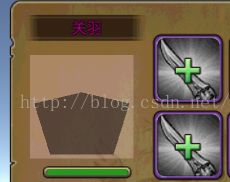在Unity中使用uGUI绘制自定义图形(饼状图 雷达图)
饼状图或者是雷达图是根据属性自动生成的自定义图形。这里展示了如何使用uGUI完成这一功能。
先附上我制作雷达图的控件的代码 UIPropWidget.cs
using UnityEngine;
using System.Collections.Generic;
using UnityEngine.UI;
/*
*
* 2 6
*
* 3 7
*
* 0 1 5 4
*
*
* 2 6位为属性0 3为属性1 0为属性2 4为属性3 7为属性4
*/
public class UIPropWidget : Graphic
{
private enum AnimationStatus
{
NOT_START,
ANIMATING,
FINISH,
}
public List _maxPropVector;
public List _testProp;
public bool _withAnimation = true;
private const int VERTEX_SIZE = 8; // 必须为4的倍数 通过绘制两个四边形组成一个五边形
private const float ANIMATION_TIME = 0.8f;
private const float MAX_PROP_VALUE = 100.0f;
private List _propList = new List();
private List _currentList = new List();
private List _vertexList = new List();
private bool _isStartAnimation = false;
private bool _isAnimationFinish = false;
private bool _isSetValue = false;
private float _startTime = 0;
private float _currentTime = 0;
protected void Awake()
{
_isStartAnimation = false;
_isAnimationFinish = false;
_isSetValue = false;
for (int i = 0; i < VERTEX_SIZE; ++i) {
_propList.Add(Vector2.zero);
_currentList.Add(Vector2.zero);
}
}
// 设置五个属性值
public void SetPropList(List list, bool withAnimation = false)
{
if (list.Count < 5) {
Log.Error("必须提供5个属性");
return;
}
// 给每个属性顶点赋值
_propList[0] = (_maxPropVector[0] - Vector2.zero) * list[2] / MAX_PROP_VALUE;
_propList[2] = (_maxPropVector[2] - Vector2.zero) * list[0] / MAX_PROP_VALUE;
_propList[3] = (_maxPropVector[3] - Vector2.zero) * list[1] / MAX_PROP_VALUE;
_propList[4] = (_maxPropVector[4] - Vector2.zero) * list[3] / MAX_PROP_VALUE;
_propList[6] = (_maxPropVector[6] - Vector2.zero) * list[0] / MAX_PROP_VALUE;
_propList[7] = (_maxPropVector[7] - Vector2.zero) * list[4] / MAX_PROP_VALUE;
// 1 5值是一样的,根据0 4位置连线取中点获取
_propList[1] = (_propList[0] + _propList[4]) / 2;
_propList[5] = (_propList[0] + _propList[4]) / 2;
_isSetValue = true;
if (withAnimation) {
PlayAnimation();
} else {
for (int i = 0; i < VERTEX_SIZE; ++i) {
_currentList[i] = _propList[i];
}
}
SetVerticesDirty();
}
// 开始播放动画
public void PlayAnimation()
{
_isAnimationFinish = false;
_isStartAnimation = true;
_startTime = Time.time;
}
void Update()
{
if (_isAnimationFinish || !_isSetValue || !_isStartAnimation) {
return;
}
// 动画播放完毕
if (Time.time - _startTime >= ANIMATION_TIME) {
for (int i = 0; i < VERTEX_SIZE; ++i) {
_currentList[i] = _propList[i];
}
_isAnimationFinish = true;
return;
}
// 更新当前动画的数据
float percent = (Time.time - _startTime) / ANIMATION_TIME;
for (int i = 0; i < VERTEX_SIZE; ++i) {
_currentList[i] = _propList[i] * percent;
}
SetVerticesDirty();
}
private void UpdateVertex(List vbo, List list)
{
// 必须要保证填充的是4的倍数
for (int i = 0; i < VERTEX_SIZE; ++i) {
var vert = UIVertex.simpleVert;
vert.color = color;
if (i < list.Count) {
vert.position = list[i];
} else {
vert.position = list[list.Count - 1];
}
vbo.Add(vert);
}
}
protected override void OnFillVBO(List vbo)
{
// 尚未赋值,不用绘制
if (!_isSetValue) {
return;
}
UpdateVertex(vbo, _currentList);
}
}
先要说明一下uGUI的渲染体系。 简单来说,就是一个CanvasRenderer进行绘制,所有的控件和可显示的元素都是Graphic。Graphic持有一个canvasRenderer,通过SetVertices设置顶点,最终完成绘制。 举例来说,Image控件就是一个Graphic,这个GameObject上面同时还有一个CanvasRenderer,两者结合起来最终把图片绘制完成。
设置的顶点格式是UIVertex,包含position、normal、color、uv0等属性。最关键的就是position,一般传一个点的坐标是相对于它自己的坐标系的像素坐标,不是全局坐标,也不是相对于父节点的坐标。举例来说,一张100*100的图片,锚点为(0.5,0.5),那么它的四个UIVertex的值分别为 (-50, -50) (-50, 50) (50, 50) (50, -50)。 无论如何移动它的位置或者改变屏幕分辨率,这几个值是不变的。除非改变Image的大小。
还有一个需要注意的是,SetVertices中设置的顶点数目必须是4的倍数,因为uGUI的绘制元素是Quad而不是三角形,所以我绘制一个五边形的雷达图的时候,需要8个顶点,通过两个四边形组合成一个五边形。
最后补充一些关于vertex设置的知识点。
一个控件的GameObject上面只允许有一个Graphic,所以不可能同时存在Image和Text。 我们自定义形状的控件可以通过两种方式来实现,一种是重载Graphic,这样这个控件就与Image等价,这里有两个比较重要的可以重载的函数 UpdateGeometry和OnFillVBO。如果看下uGUI的源代码可以发现,UpdateGeometry其实就是获取一个List
上面有提到BaseVertexEffect,这个就是另外一个可以修改顶点信息的地方,它是一个修饰的组件,以Text和Outline为例,Text是一个Graphic,在控件上面添加的Outline
就是一个BaseVertexEffect,Graphic在运行的时候会获取控件上面所有的BaseVertexEffect,然后设置顶点的时候依次调用。 我们可以实现一个自定义效果,继承自BaseVertexEffect,然后重载ModifyVertex函数进行顶点设置。
当这些知识点理清楚后,一个雷达图简直是小菜一碟。
更新5.2 api已修改,应该说是更加简化了,修改后的代码如下:
using UnityEngine;
using System.Collections.Generic;
using UnityEngine.UI;
/*
*
* 2 6
*
* 3 7
*
* 0 1 5 4
*
*
* 2 6位为属性0 3为属性1 0为属性2 4为属性3 7为属性4
*/
public class UIPropWidget : Graphic
{
private enum AnimationStatus
{
NOT_START,
ANIMATING,
FINISH,
}
public List _maxPropVector;
public bool _withAnimation = true;
public const int MAX_PROP_COUNT = 5;
private const float ANIMATION_TIME = 0.8f;
private const float MAX_PROP_VALUE = 100.0f;
private Vector2[] _propList = new Vector2[MAX_PROP_COUNT];
private Vector2[] _currentList = new Vector2[MAX_PROP_COUNT];
private bool _isStartAnimation = false;
private bool _isAnimationFinish = false;
private bool _isSetValue = false;
private float _startTime = 0;
private float _currentTime = 0;
protected override void Awake()
{
base.Awake();
_isStartAnimation = false;
_isAnimationFinish = false;
_isSetValue = false;
}
// 设置五个属性值
public void SetPropList(List list, bool withAnimation = false)
{
if (list.Count < MAX_PROP_COUNT) {
Log.Error("必须提供5个属性");
return;
}
var r = GetPixelAdjustedRect();
var v = new Vector4(r.x, r.y, r.x + r.width, r.y + r.height);
// v.x,v.y为左下角的点 v.z,v.w为右上角的点
_propList[0] = new Vector3(v.x * _maxPropVector[0].x, v.y * _maxPropVector[0].y) * list[0] / MAX_PROP_VALUE; // 1
_propList[1] = new Vector3(v.z * _maxPropVector[1].x, v.y * _maxPropVector[1].y) * list[1] / MAX_PROP_VALUE; // 2
_propList[2] = new Vector3(v.z * _maxPropVector[2].x, v.w * _maxPropVector[2].y) * list[2] / MAX_PROP_VALUE; // 3
_propList[3] = new Vector3(v.x * _maxPropVector[3].x, v.w * _maxPropVector[3].y) * list[3] / MAX_PROP_VALUE; // 4
_propList[4] = new Vector3(v.x * _maxPropVector[4].x, v.w * _maxPropVector[4].y) * list[4] / MAX_PROP_VALUE; // 5
if (withAnimation) {
PlayAnimation();
} else {
for (int i = 0; i < MAX_PROP_COUNT; ++i) {
_currentList[i] = _propList[i];
}
}
SetVerticesDirty();
}
// 开始播放动画
public void PlayAnimation()
{
_isAnimationFinish = false;
_isStartAnimation = true;
_startTime = Time.time;
}
void Update()
{
if (_isAnimationFinish || !_isSetValue || !_isStartAnimation) {
return;
}
// 动画播放完毕
if (Time.time - _startTime >= ANIMATION_TIME) {
for (int i = 0; i < MAX_PROP_COUNT; ++i) {
_currentList[i] = _propList[i];
}
_isAnimationFinish = true;
return;
}
// 更新当前动画的数据
float percent = (Time.time - _startTime) / ANIMATION_TIME;
for (int i = 0; i < MAX_PROP_COUNT; ++i) {
_currentList[i] = _propList[i] * percent;
}
SetVerticesDirty();
}
protected override void OnPopulateMesh(VertexHelper vh)
{
// 尚未赋值,不用绘制
if (!_isSetValue) {
return;
}
Color32 color32 = color;
vh.Clear();
vh.AddVert(new Vector3(0, 0), color32, new Vector2(0f, 0f)); // 0
vh.AddVert(_currentList[0], color32, new Vector2(0f, 0f)); // 1
vh.AddVert(_currentList[1], color32, new Vector2(0f, 1f)); // 2
vh.AddVert(_currentList[2], color32, new Vector2(1f, 1f)); // 3
vh.AddVert(_currentList[3], color32, new Vector2(1f, 0f)); // 4
vh.AddVert(_currentList[4], color32, new Vector2(1f, 0f)); // 5
vh.AddTriangle(0, 1, 2);
vh.AddTriangle(0, 2, 3);
vh.AddTriangle(0, 3, 4);
vh.AddTriangle(0, 4, 5);
vh.AddTriangle(0, 5, 1);
}
}
重点在于绘制函数修改为OnPopulateMesh,使用VertexHelper来设置顶点,先设置所有的顶点,然后按照三角形或者者是四边形填充索引,学过dx或者opengl的这里应该非常耗理解
